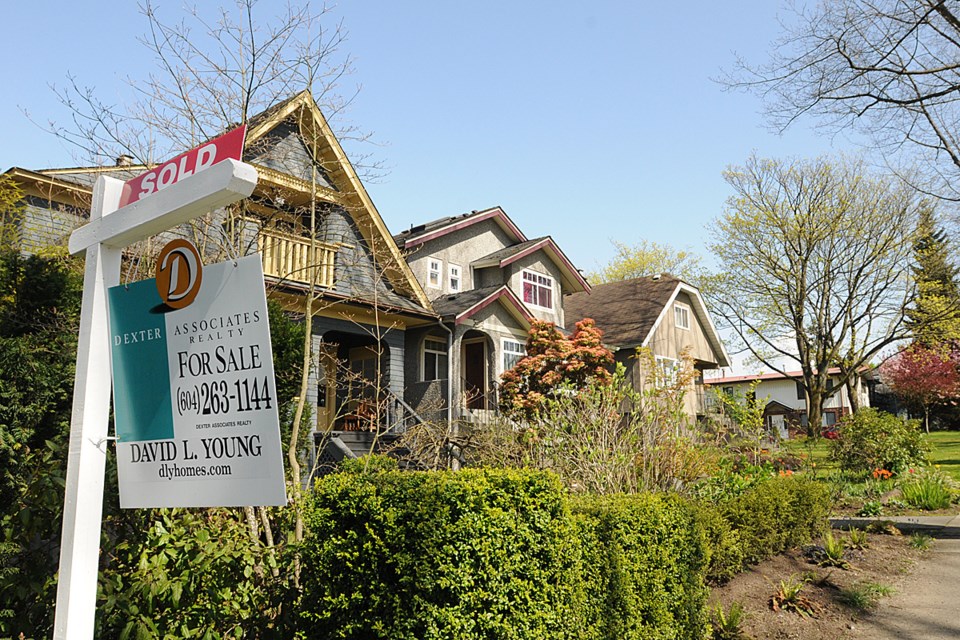If you take a look at home price trends, they tend to follow mortgage affordability levels pretty closely, albeit with a slight lag.
In 2017, when the real estate market in Canada’s major cities was at its most recent peak, you could get a five-year fixed-rate mortgage for as little as 2.2 per cent. This – among other factors – brought buyers out in droves, leading to prices soaring. In Metro Vancouver, benchmark prices reached their height in spring 2018.
However, the Bank of Canada raised its overnight rate several times between summer 2017 and the end of 2018 (pushing up variable rate mortgages). Meanwhile, rising bond yields meant that fixed-rate mortgages also increased, and the cheapest fixed rate an applicant could get climbed back up over the three per cent mark in spring 2018.
Added to that, of course, was the federal mortgage stress test that was launched in January 2018, which required all mortgage applicants to qualify at the Bank of Canada’s posted rate (which had also climbed), or their contracted rate plus two per cent, whichever was the higher.
In the space of just over a year, mortgages went from dirt cheap to barely manageable, or at least tough to qualify for. It’s no wonder home sales plummeted, and prices followed that decline.
However, two new factors could see that trend reversed equally quickly.
The first is that mortgage interest rates – and the rate at which you have to qualify – are dropping. With bond yields falling, lenders are offering much better deals on five-year fixed rates, with 2.36 per cent now available, according to RateHub.ca. This means that buyers can now afford a higher home price for the same monthly mortgage payment. And in response to the falling discounted rates, the for the mortgage stress test to 5.19 per cent, further giving buyers increased purchasing power.
The second is that home sales in both Metro Vancouver and Greater Toronto jumped 24 per cent year over year in July, and Victoria home sales were up 13 per cent on an annual basis. It may be too soon to indicate a trend, but that significant uptick in activity shows that buyers are still out there. It may be that more are coming off the sidelines, encouraged by the combination of lowered prices and reduced mortgage rates giving them greater affordability.
Human nature pretty much dictates that if something that you want becomes more affordable, very few people will save the difference for a rainy day – they’ll just buy more of it, to the maximum that they can afford. Nowhere is this truer than in real estate, in which we all buy homes at the highest price that we can comfortably afford, in order to obtain the best possible standard of living. Added to that, human nature dictates that we follow what other people are doing, including buying (or not buying) real estate.
If home sales were to see strong sales from August through October this year, the combination of that renewed buzz with cheaper mortgages on lower-priced homes would likely reverse our recent market slowdown. And if that happened, prices would inevitably start rising again.
Douglas Porter, BMO’s chief economist, that the biggest risk to Canada’s housing market currently was not a crash, but a return to “nosebleed levels of price growth.”
Could lower interest rates also spark a resurgence in overseas speculation in Canadian real estate, which has fallen off since the launch of the foreign buyer tax in major cities? (Also, consider that Canadian real estate prices are now at a tempting discount from where they were a year or two ago, and that to find save havens for their cash.)
Porter thinks this is a significant risk, and wrote in a client note, “Domestic policymakers [in Canada] may need to consider other ways to control [real estate] speculation – especially from abroad – in a world where interest rates stay below inflation, or even below zero.”
And what of high levels of new home construction in Metro Vancouver – won't they flood the market and potentially cause a price crash? RBC Economics says that even though construction levels are very high historically speaking, "low inventories and rental vacancy rate, as well as rapid population growth, largely mitigate such risk."
But RBC Economics also thinks home prices are still too high in major urban centres to see a rapid recovery in the market.
It may be that real estate prices will have to go a little further down before they go back up. But back up, you can be sure, they will eventually go.




